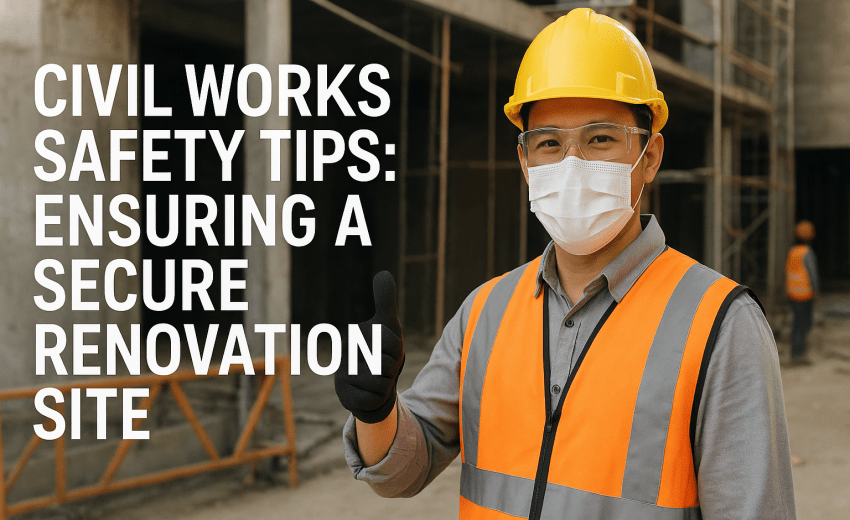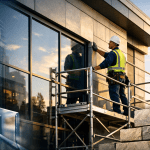
Civil Works are the backbone of every renovation project, from small-scale home improvements to large commercial overhauls. While the focus is often on design, timelines, and budgets, safety is an aspect that cannot be overlooked. Renovation sites pose unique challenges, such as unstable structures, electrical hazards, and heavy machinery, making proper safety measures essential. A secure renovation site not only protects workers but also ensures that the project progresses without costly delays caused by accidents or violations.
In this blog, we will explore critical Civil Works safety tips that every contractor, property owner, and worker should follow to guarantee a safe and efficient renovation environment.
1. Conduct Thorough Risk Assessments
Every Civil Works project should begin with a comprehensive risk assessment. Before any work starts, it is crucial to identify potential hazards, such as weak flooring, exposed wiring, or asbestos. A detailed assessment helps determine the right protective measures and minimizes unforeseen accidents. Regular reassessments throughout the renovation process are equally important as new risks may emerge at different stages of the project.
2. Ensure Proper Site Organization
A well-organized site is a safe site. Materials, equipment, and tools should be stored neatly and away from pathways. Clearly marked zones for workers, machinery, and visitors help prevent confusion and reduce accidents. Simple steps such as securing scaffolding, creating proper waste disposal areas, and setting up barriers around hazardous zones can drastically improve overall safety in Civil Works.
3. Provide Personal Protective Equipment (PPE)
Personal Protective Equipment is non-negotiable in Civil Works. Workers should always be equipped with helmets, safety goggles, gloves, steel-toed boots, and high-visibility vests. Depending on the nature of the renovation, additional gear such as ear protection, dust masks, or harnesses may also be required. Regular training sessions on how to correctly use PPE can further enhance safety compliance.
4. Emphasize Electrical Safety
Renovation projects often involve rewiring, installing new systems, or relocating electrical lines. Mishandling electricity is one of the leading causes of accidents in Civil Works. Always ensure that only licensed electricians carry out electrical tasks. Switch off the power supply before working, label circuits clearly, and use insulated tools to avoid shocks and fire hazards.
5. Manage Dust and Debris
Dust and debris are inevitable in Civil Works but can create health risks and fire hazards if not properly managed. Installing dust barriers, using air filtration systems, and ensuring frequent cleaning can help minimize airborne particles. Workers should wear masks to prevent respiratory issues, and debris should be promptly cleared to maintain clear walkways.
6. Train and Educate Workers
Even the most detailed safety plan will fail without proper training. All workers should be educated on the site’s safety protocols, emergency exits, and the correct operation of machinery. Regular refresher sessions and toolbox talks can reinforce best practices. Well-trained staff in Civil Works are less likely to make mistakes that could endanger themselves or others.
7. Implement Fall Protection Measures
Falls are one of the most common causes of injury in construction and Civil Works. Whether using ladders, scaffolding, or working on elevated surfaces, fall protection systems such as guardrails, safety nets, and harnesses must be in place. Workers should also be trained on how to secure themselves properly when working at heights.
8. Fire Safety Precautions
Renovation sites often contain flammable materials such as paint, solvents, and adhesives. Combine this with electrical wiring and equipment, and the fire risk increases. Fire extinguishers should be easily accessible, and workers should be trained in their use. Proper ventilation reduces the buildup of flammable fumes, while designated smoking areas away from work zones further reduce risks.
9. Maintain Clear Communication
Strong communication is a cornerstone of Civil Works safety. Walkie-talkies, hand signals, and clear signage help ensure that everyone on-site is aware of ongoing tasks and potential hazards. Regular safety briefings at the start of each day can set the tone and remind workers of their responsibilities.
10. Regular Safety Inspections
Finally, continuous monitoring is key. Supervisors should conduct regular inspections to check compliance with safety standards, ensure PPE usage, and verify that machinery and scaffolding remain secure. Documentation of these inspections provides accountability and helps identify recurring issues before they escalate.
Conclusion
Civil Works safety is not a one-time effort but an ongoing commitment throughout the duration of any renovation project. From risk assessments and PPE to training and communication, each measure plays a vital role in safeguarding lives and ensuring efficiency. A secure renovation site not only protects workers but also instills confidence in clients, demonstrating professionalism and responsibility.
By implementing these safety tips, Civil Works projects can achieve their goals without unnecessary risks, delays, or setbacks. In the end, safety is the foundation of successful renovation—because a well-protected team builds stronger, better results.
Ready to Build with Confidence?
Get in touch with Charminar to learn how our project management expertise can streamline your next development.
📧 contact@bluediamondfm.com
📞 +971 56 705 4223
🌐 https://charminardubai.com/
Frequently Asked Questions (FAQ)
Why is safety important in Civil Works renovation projects?
Safety ensures that workers, contractors, and visitors are protected from accidents, injuries, and hazards. It also helps avoid costly project delays, legal issues, and damage to property.
What are the most common hazards in Civil Works?
Some of the most common hazards include falls from heights, electrical shocks, exposure to dust and debris, improper use of machinery, and fire risks from flammable materials.
Who is responsible for ensuring safety on a renovation site?
The responsibility is shared among contractors, site supervisors, and workers. Property owners also play a role by hiring licensed professionals who follow safety standards.
What safety gear is mandatory for Civil Works?
Mandatory gear typically includes helmets, safety goggles, gloves, reflective vests, steel-toed boots, and masks. Depending on the task, ear protection and harnesses may also be required.
How often should safety inspections be carried out?
Safety inspections should be conducted before work begins and regularly throughout the project. Daily checks and weekly formal inspections are recommended to identify and resolve issues quickly.







